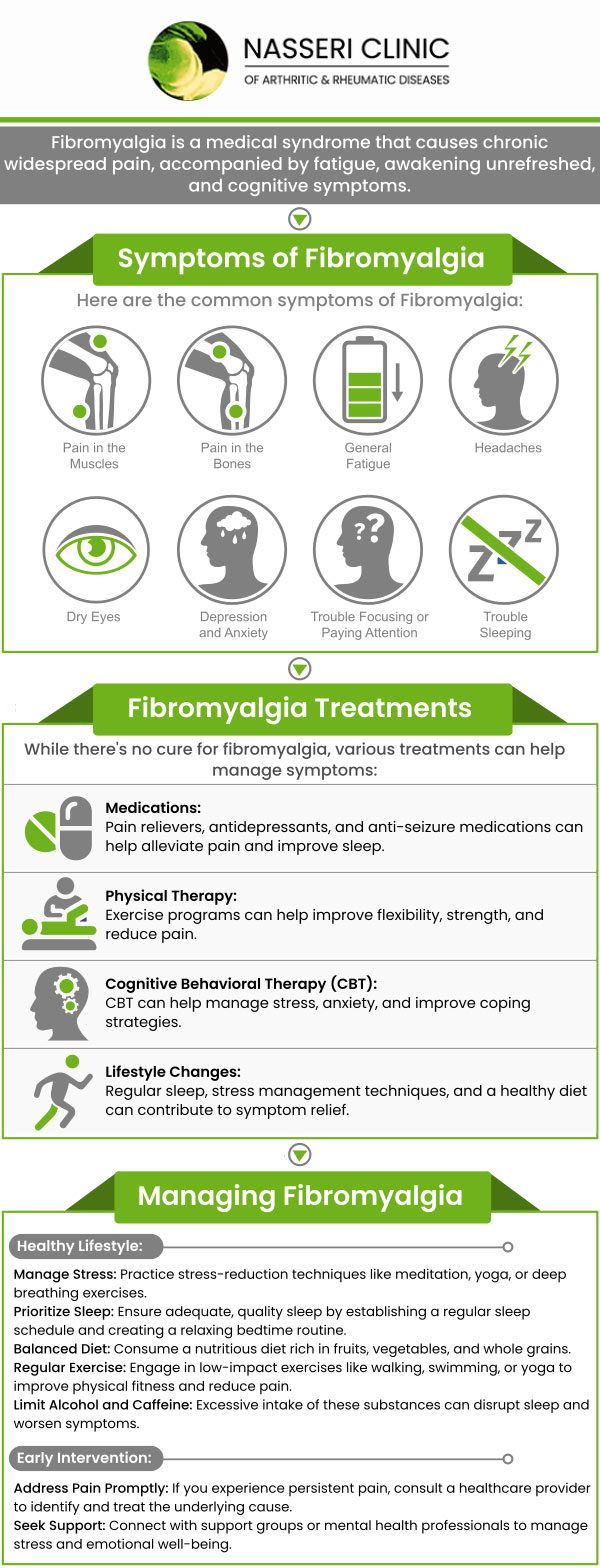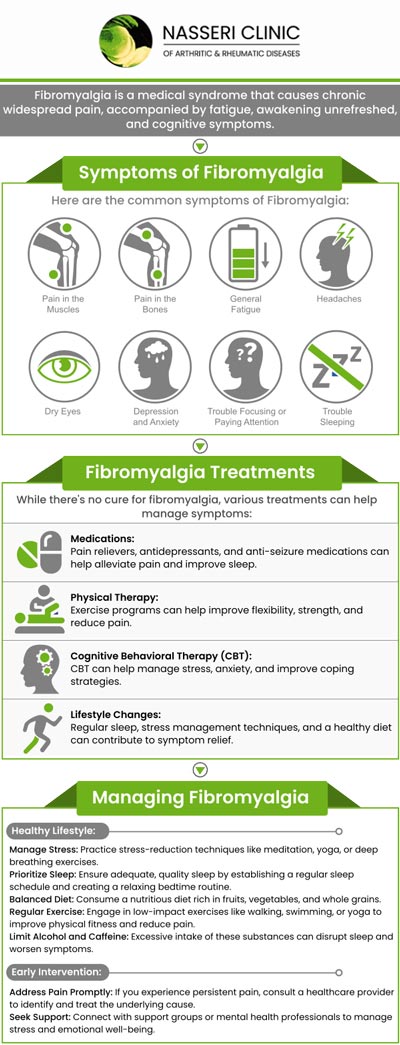Fibromyalgia Signs and Symptoms Q&A
Fibromyalgia is a chronic condition that causes widespread pain and tenderness in the body’s muscles, ligaments, and tendons. Common signs and symptoms include persistent fatigue, difficulty sleeping, headaches, memory issues (often referred to as “fibro fog”), and stiffness in the joints. If you’re noticing these symptoms near you, consult our healthcare professionals for proper diagnosis and management options tailored to your needs. For more information, contact us or book an appointment online. We have convenient locations to serve you in Catonsville, Glen Burnie, Columbia, North Baltimore, Rosedale, and Edgewater, MD.


Table of Contents:
What are the first signs of fibromyalgia, and how do they progress over time?
What are the most common symptoms of fibromyalgia?
Is fibromyalgia pain constant, or does it fluctuate over time?
Can fibromyalgia cause joint pain similar to arthritis, even without inflammation?
Fibromyalgia is characterized by widespread pain and a variety of other symptoms that can significantly impact daily life. At our clinic, we recognize that the first signs of fibromyalgia often include persistent pain and tenderness in multiple areas of the body. Our experienced team is skilled in distinguishing these symptoms from other conditions, ensuring an accurate diagnosis and appropriate treatment plan.
We are aware that individuals with fibromyalgia may experience significant fatigue, sleep disturbances, and cognitive difficulties, commonly known as “fibro fog.” At the Nasseri Clinic, we take a comprehensive approach to address these issues, providing strategies that help improve sleep quality, manage fatigue, and enhance cognitive function.
Our team also acknowledges the presence of overlapping symptoms such as headaches, irritable bowel syndrome, and mood disorders like depression and anxiety. We collaborate closely with our patients to develop holistic management plans that consider all aspects of their health and well-being.
Understanding that fibromyalgia symptoms can fluctuate in response to stress, physical activity, and environmental factors, we offer guidance on lifestyle modifications and coping mechanisms to help patients stabilize their symptoms. Our aim is to empower individuals with fibromyalgia to lead fulfilling lives despite the challenges posed by their condition.
At the Nasseri Clinic of Arthritic and Rheumatic Diseases, we understand the complex and multifaceted nature of fibromyalgia, a condition that shares many overlapping symptoms with other rheumatic diseases. Our clinic is dedicated to providing comprehensive care for individuals suffering from fibromyalgia, recognizing it as a chronic condition that requires a nuanced and personalized approach to management.
Our team of specialists is well-versed in diagnosing and treating the hallmark symptoms of fibromyalgia, including widespread musculoskeletal pain. We focus on evidence-based strategies to alleviate the constant dull ache that affects multiple areas of the body. Understanding that fibromyalgia often presents alongside fatigue and sleep disturbances, we prioritize addressing these issues through tailored interventions that aim to improve your sleep quality and energy levels.
We are also attentive to cognitive difficulties, commonly known as “fibro fog,” and work with you to develop strategies to enhance concentration and memory. Recognizing the impact of headaches, heightened sensitivity, and IBS-like symptoms on your quality of life, we offer integrated treatment plans that consider all aspects of your health.
At the Nasseri Clinic, we recognize the importance of addressing the psychological aspects of fibromyalgia. Our approach includes support for managing mood disorders such as depression and anxiety, which are often interlinked with the physical symptoms of the condition. We emphasize a holistic approach that considers both the physical and emotional well-being of our patients.
Fibromyalgia is characterized by widespread pain, fatigue, and localized tenderness, with symptoms that can vary greatly from one individual to another.
In our clinic, we often encounter patients who experience fibromyalgia pain differently. For some, it manifests as a persistent, daily ache, significantly impacting their daily activities and quality of life. For others, the pain tends to fluctuate, with periods of heightened intensity, known as “flare-ups,” interspersed with times of more manageable discomfort. These flare-ups can be triggered by factors such as physical or emotional stress, weather changes, poor sleep, or overexertion.
Given the variable nature of fibromyalgia pain, which can shift in intensity and location—from the shoulders one week to the lower back or legs the next—it poses unique diagnostic and management challenges. At the Nasseri Clinic, our approach to fibromyalgia is tailored to each patient’s specific symptom patterns. We emphasize flexible pain management strategies and lifestyle adjustments that can adapt to the fluctuating nature of the condition.
Our team of specialists is dedicated to providing comprehensive care that addresses the multifaceted aspects of fibromyalgia. Through personalized treatment plans that may include medication, physical therapy, stress management techniques, and lifestyle modifications, we aim to improve our patients’ quality of life and help them navigate the complexities of living with fibromyalgia.
Arthritis involves inflammation of the joints, often resulting in swelling, redness, and warmth. This inflammation is a hallmark of conditions like rheumatoid arthritis and osteoarthritis, which are common concerns at our clinic. In contrast, fibromyalgia does not cause joint inflammation. Instead, it is characterized by altered pain processing in the brain, leading to heightened pain sensitivity. Consequently, individuals with fibromyalgia may experience pain akin to arthritis, particularly around the joints, despite the absence of inflammation.
Patients at Nasseri Clinic may describe their fibromyalgia-related joint pain as aching, stiffness, or tenderness, which can be confusing due to its similarity to arthritis symptoms. However, diagnostic tests such as blood work and imaging typically do not reveal the inflammatory markers or joint damage seen in arthritis, helping us distinguish between these conditions.
It’s also important to recognize that fibromyalgia can coexist with arthritis, complicating diagnosis and treatment. Our experienced team at Nasseri Clinic is dedicated to accurately identifying and managing these overlapping conditions. We focus on comprehensive treatment plans that address the unique aspects of fibromyalgia, including pain management, sleep improvement, and stress reduction. Our strategies may involve medications, physical therapy, tailored exercise programs, and cognitive-behavioral therapy to help patients maintain their quality of life.
At Nasseri Clinic of Arthritic and Rheumatic Diseases, we are committed to providing personalized care that acknowledges the distinct nature of fibromyalgia. By understanding these differences, we can develop effective treatment plans that cater to the specific needs of our patients, ensuring they receive the best possible care. For more information, contact us or book an appointment online. We have convenient locations to serve you in Maryland. We serve patients from Catonsville MD, Glen Burnie MD, Columbia MD, North Baltimore MD, Rosedale MD, Edgewater MD, Hebbville MD, Woodlawn MD, Pasadena MD, Jacobsville MD, Ellicott City MD, Laurel MD, Dundalk MD, Halethorpe MD, Overlea MD, Parkville MD, Riva MD, Annapolis MD, Ferndale MD, and surrounding areas.
Check Out Our 5 Star Reviews


Additional Services You May Need

Additional Services You May Need
▸ Arthritis Care
▸ Infusion Therapy
▸ Lab Services
▸ Radiology
▸ NCARD NRACE
▸ BioFlex Laser Therapy
▸ Ultrasound Guided Injection
▸ NCARD PRP
▸ NCARD Myers
▸ Rheumatology
▸ Myositis
▸ Osteoporosis
▸ Ulcerative Colitis
▸ Multiple Sclerosis
▸ Saphnelo Infusion
▸ Injection Treatments
▸ Intravenous Immunoglobulin Therapy
▸ Asthma
▸ Crohn’s Disease
▸ Fibromyalgia
▸ Infusion Therapy for Gout
▸ Inflammatory Eye Disease
▸ Inflammatory Skin Disease
▸ Vasculitis
▸ Iron Deficiency
▸ Lupus


